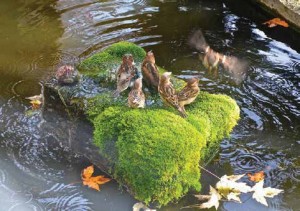
Moderator Jayson MacLean (left) and panelists Mary Trudeau, Robb Barnes and Amy MacPherson shared advice and recommendations on how to preserve and protect our community’s (non-human) ecosystems.
The next community webinar takes place on March 17th. Photo Supplied
Old Ottawa East webinar panellists, participants were eager to explore what individuals can do to protect our local environment
PIPPA NORMAN
Supporting biodiversity in urban environments can be as easy as planting a native shrub to prevent harmful pollutants from entering nearby storm sewers, 70 participants in the latest community webinar presented by The Mainstreeter and two other Old Ottawa East organizations learned.
Held on January 20, the webinar was the second in the six-part Social Issues Discussion Series put together by The Mainstreeter, in association with the Mauril-Bélanger Social Innovation Workshop of Saint Paul University and the Community Activities Group of Old Ottawa East. This series is intended to inform residents on topics of relevance to their community, according to Lorne Abugov, the Editor of The Mainstreeter.
Biodiversity is the variety of plant and animal species that coexist in a natural environment, and in Old Ottawa East (OOE) this environment includes both land and water bodies.
Armed with a metaphor, Jayson Maclean, Chair of Sustainable Living Old Ottawa East (SLOE) and moderator for the evening, helped explain this concept to participants. “Just like a woven tapestry, the strength comes from the presence of many fibres that are interwoven together,” MacLean said.
OOE resident Mary Trudeau, director of the environmental consultancy, Envirings Inc. and one of the three panellists, sought to remind members of the community that anything flowing into the storm sewers from the streets goes directly into either the Rideau River or Rideau Canal. “A lot of people think that it goes into some kind of wastewater treatment facility, but it doesn’t, it goes right into the river,” Trudeau said.
She explained how aquatic species can be harmed by pollution, increased water temperature, and increased water flow, as a direct result of residents’ actions. To remedy this, Trudeau joined the second panellist, Amy MacPherson, in recommending residents plant native plants around their property to help water absorption.
“We have all of these problems and sometimes they seem overwhelming, but the solution really is to get back to nature,” MacPherson said. “If you can’t plant a tree, then a shrub, and if not a shrub, then a native flower.”

Community interest in sustaining the natural ecosystems of Old Ottawa East produced an engaging webinar for registrants to The Mainstreeter’s Social Issues Discussion Series.
Photo by Peter Fowler
MacPherson, an environmental biologist at the City of Ottawa’s Natural Systems & Rural Affairs unit, called attention to the importance of pollinator species and had an unusual tip for residents on how to protect them. “Take a break from your yard work, do less. It’s very important for pollinator’s sake, that you do not tidy up all of the leaf litter and all of the dead stems, since all of that provides habitat and shelter for pollinators,” she said.
Another Old Ottawa East resident, Robb Barnes, Executive Director at Ecology Ottawa and the final panellist championed OOE as one of Ottawa’s most environmentally active communities. His advice was to never underestimate the power of local politics. “It’s important that our elected representatives hear from us continuously and know that there’s a constituency of people watching and expecting action on important topics like protecting nature in our communities,” Barnes said.
Sundaura Alford-Purvis, a Vanier resident and landscape designer, attended the webinar because she was curious to see what hands-on ideas the panellists would offer residents. In a post-event interview, Alford-Purvis said she was impressed by the speakers and eager for more. “It was very much political action, which is the background that the speakers come from, and is really, really important,” she said. “But I’m always sort of looking for where’s the communication for what you can actually do in your own space?”
Peter Croal, a retired geologist and webinar attendee who resides in Old Ottawa East, agreed with Alford-Purvis. He praised the information provided by the panellists and hoped that in future panels, even more, practical tools would be given out. “If biodiversity is an issue in Old Ottawa East, which it is, because of climate change, and all these things, then what can residents do to help make a worsening situation better?” he asked. “Perhaps in future panels, there’ll be more conversations on practical solutions that people can take.”
To view, the recording of the Sustaining Biodiversity webinar click here and skip to 8:00 time mark on video to view commencement of the webinar.
![]() The Mainstreeter’s next free webinar will be held on Wednesday, March 17 and is entitled “Affordable Housing and Healthy, Diverse Communities.” Registration is now open at: https://bit.ly/affordablehousing_ooe.
The Mainstreeter’s next free webinar will be held on Wednesday, March 17 and is entitled “Affordable Housing and Healthy, Diverse Communities.” Registration is now open at: https://bit.ly/affordablehousing_ooe.






